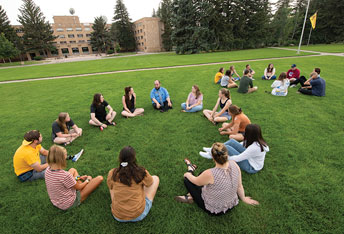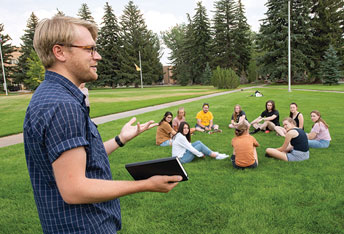
Contact Us
Institutional Communications
Bureau of Mines Building, Room 137
Laramie, WY 82071
Phone: (307) 766-2929
Email: cbaldwin@uwyo.edu
Partnering for Inclusion
September 10, 2021

Residence Coordinator Anthony Zimny (center) works with student resident assistants
during a restorative justice training.
UW’s Office of Diversity, Equity and Inclusion partners broadly for a team effort toward success.
By Micaela Myers
The University of Wyoming’s Office of Diversity, Equity and Inclusion (ODEI) partners with individuals across campus and throughout the community to achieve its goals of making UW a leading institution where people of all identities, diverse perspectives and life experiences encounter a welcoming environment.
Nearly 50 members sit on the ODEI council, and its five subcommittees represent nearly 90 members, including alumni, community members, students, faculty and staff. Subcommittee topics include community engagement, pay equity, recruitment and retention, inclusive physical spaces and accessibility.
“Diversity, equity and inclusion work can’t be done just by one office or area,” says Director of Strategic Inclusivity Initiatives Christi Carter. “Partners have to support initiatives for them to be successful. It’s a great opportunity to work broadly with members of the campus and greater community.”
For example, the community engagement subcommittee works with Albany County School District #1 to support diversity, equity and inclusion in the district, and the subcommittee also worked with the ODEI to bring a National Coalition Building Institute workshop to Laramie this fall to facilitate communication and trust building between law enforcement and the community.
In addition to the council and subcommittees, ODEI continues to launch new programming on campus, including two recent programs: restorative justice and the search equity advisors program for inclusive excellence in the hiring process.
Restorative Justice
In 2019, ODEI partnered with the University of Michigan restorative justice (RJ) trainers to conduct a three-day workshop in Laramie for over 30 UW faculty and staff members from across campus. Since then, the team members meet regularly to practice and grow their skills, led by Connor Novotny. Starting in the fall, Novotny moved into a newly created role within the Dean of Students Office as the restorative justice program manager and will continue working with the ODEI on RJ Initiatives.
Restorative justice has deep roots in many indigenous cultures and continues to gain traction in schools, colleges and youth corrections as a non-punitive way of addressing, repairing and restoring harm (a term that means a person works to repair the damage caused by their actions). All parties report better satisfaction with learning and outcomes, according to surveys done at universities that use restorative justice. Often, colleges use restorative justice as a means of addressing student conduct violations.
“Restorative justice is a tool for people to come together and discuss how harms are affecting them as members of a community,” Novotny says.
For example, a student who vandalized university property may agree to pay restitution for the damage, to help physically repair the damage, and, if the student was inebriated at the time of the incident, to go to an alcohol evaluation or organize an alcohol-free event on campus.
“A lot of times, people might make a mistake, regret their choices and want to be integrated and welcomed back as a member of the community,” Novotny says. “Here at UW, we’re focusing on how we can build a program that educates people and promotes the philosophy of restorative justice while offering practices to address instances of harm that arise on campus.”
Restorative justice programming often takes the form of a circle or conference that brings together the harmed party or parties, the person or persons who did the harm, and support persons for both, as well as concerned community members. They sit in a circle and share how the incident happened, how it impacted them and ultimately what can be done to repair the harm. Working with student leader Riley Talamantes, Novotny kicked the fall semester off with an event for rising sophomores discussing how the pandemic impacted their first year and what can be done to make up for those harms.
The ODEI hopes to continue to grow the program, offering restorative justice for faculty and staff issues and eventually the broader community of Laramie, while also becoming a statewide resource.

Restorative Justice Program Manager Connor Novotny leads an introduction to RJ for
resident assistants.
Search Equity Advisors
One of President Ed Seidel’s four pillars for UW is inclusivity. To help meet this goal, ODEI launched the search equity advisers (SEA) program led by Carter and College of Arts and Sciences Associate Dean and Professor Teena Gabrielson.
“It’s a partnership between our office and Academic Affairs to really change the culture of UW by focusing on what we can do as an institution to make our search process more inclusive and mindful of diversifying the university,” Carter says.
The program raises the bar by extending a two-hour workshop to a 13.5-hour workshop, beginning with a set of faculty volunteers this August who will then take that knowledge and partner with hiring committees in other departments to facilitate these important discussions.
To launch the program, Carter and Gabrielson participated in a 16-hour course through Oregon State University and then tailored OSU’s celebrated search advocate program to meet the needs of UW. The program’s objectives are to build awareness of and adherence to best practices for inclusive excellence in the search and selection process, to promote greater diversity in UW’s workforce, and to facilitate meaningful conversations that promote diversity, equity and inclusion in hiring process.
“This program has the potential not only to improve our search and selection processes but to bring questions of implicit bias and diversity, equity and inclusion into a variety of decision-making contexts on campus,” says Gabrielson, who has a strong background in curriculum development.
In addition to things such as implicit bias, the trainings cover the legal context and early strategies for inclusive excellence, including how job listings are written and where they’re posted. While UW currently does receive diverse applicants, the conversion rate is low.
“Recruitment and retention of underrepresented workforce is an issue at UW,” Carter says. “The SEA program works in conjunction with other initiatives to make UW welcoming to a wide variety of people to want to work here and be a part of the community.”
After the launch this August, the program will continue to grow and evolve. It is expected that a workshop for staff will be developed and rolled out in the future.
Student Focused
In the end, all the efforts of ODEI are aimed at creating a better experience for UW students. “With our inclusionary and global leadership program, we’re really looking at our next generation of leaders and how we can enhance their education,” Carter says. “Our world is more interconnected every day. We’d do our students a disservice if we didn’t have them graduate with cultural competence.”
Even the employee-focused programming impacts students with a more diverse and educated pool of faculty and staff.
“At the end of the day, we’re all focused on student success and what we can do as a campus community to create that sense of belonging,” Carter says. “Whatever your background or social identity, all can find their home here and thrive. That’s our ultimate goal.”
Contact Us
Institutional Communications
Bureau of Mines Building, Room 137
Laramie, WY 82071
Phone: (307) 766-2929
Email: cbaldwin@uwyo.edu


